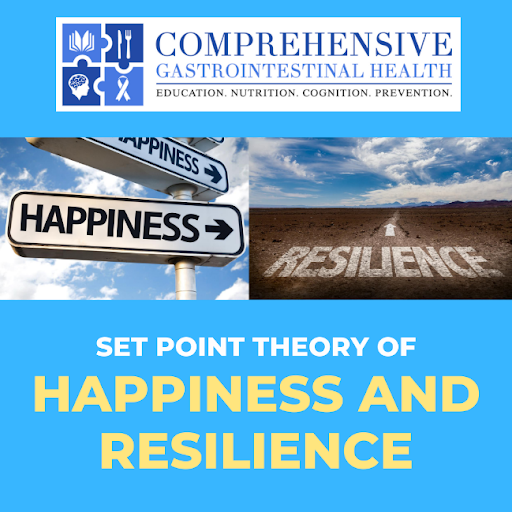SET POINT THEORY OF HAPPINESS AND RESILIENCE

SET POINT THEORY OF HAPPINESS AND RESILIENCE
by Jen Buettner, RN
My friend and yoga teacher, Dianne, started her yoga class with setting an intention and introduced us to the set point theory of happiness. I left that class feeling calm, grateful and inspired as it was able to set my mood for the day. After that euphoric moment, I decided to dive deeper and research articles about the theory. I also did a lot of self-reflection on how I was able to remain happy and resilient in my own personal journey during challenging times. Now confronted by COVID, I am using what I learned to practice daily how to reset my expectations, remind myself to be present in the here and now, and to be grateful for what we do have.
Check out these two articles that I have discovered in my search for methods to help cope with this pandemic: Set point theory of happiness and Resilience. This article describes “The Set Point for Happiness”:
We humans are creatures of habit. We are remarkably resilient and have an extraordinary ability to adapt to our surroundings. When it comes to our sense of well-being, we have something called a set point for happiness.
Psychology Today: Your Set Point for Happiness
“The set point for happiness is psychological term that describes our general level of happiness. Each of us has a different set point—some have a high set point, meaning we are mostly happy; some of have a low set point, meaning we are mostly unhappy; while others fall somewhere in between. Our set point for happiness is based on genetics and conditioning. While we may have emotional ups and downs throughout our lives, these are temporary. No matter what life throws.”
“The studies also suggest that we can fix our happiness set-point permanently higher — by helping others.”
The other article I reflected on was “Resilience: Build skills to endure hardship”:
Mayo Clinic: Resilience: Build skills to endure hardship
“Resilience means being able to adapt to life’s misfortunes and setbacks. Test your resilience level and get tips to build your own resilience.”
“Resilience won’t make your problems go away — but resilience can give you the ability to see past them, find enjoyment in life and better handle stress. If you aren’t as resilient as you’d like to be, you can develop skills to become more resilient.”
“Adapting to adversity:
Resilience is the ability to adapt to difficult situations. When stress, adversity or trauma strikes, you still experience anger, grief and pain, but you’re able to keep functioning — both physically and psychologically. However, resilience isn’t about putting up with something difficult, being stoic or figuring it out on your own. In fact, being able to reach out to others for support is a key part of being resilient.”
“Resilience and mental health:
Resilience can help protect you from various mental health conditions, such as depression and anxiety. Resilience can also help offset factors that increase the risk of mental health conditions, such as being bullied or previous trauma. If you have an existing mental health condition, being resilient can improve your coping ability.”
TIPS to improve your resilience:
- Get connected. Building strong, positive relationships with loved ones and friends can provide you with needed support and acceptance in good and bad times. Establish other important connections by volunteering or joining a faith or spiritual community.
- Make every day meaningful. Do something that gives you a sense of accomplishment and purpose every day. Set goals to help you look toward the future with meaning.
- Learn from experience. Think of how you’ve coped with hardships in the past. Consider the skills and strategies that helped you through difficult times. You might even write about past experiences in a journal to help you identify positive and negative behavior patterns — and guide your future behavior.
- Remain hopeful. You can’t change the past, but you can always look toward the future. Accepting and even anticipating change makes it easier to adapt and view new challenges with less anxiety.
- Take care of yourself. Tend to your own needs and feelings. Participate in activities and hobbies you enjoy. Include physical activity in your daily routine. Get plenty of sleep. Eat a healthy diet. Practice stress management and relaxation techniques, such as yoga, meditation, guided imagery, deep breathing or prayer.
- Be proactive. Don’t ignore your problems. Instead, figure out what needs to be done, make a plan, and take action. Although it can take time to recover from a major setback, traumatic event or loss, know that your situation can improve if you work at it.
Why would a gastroenterology office post about methods to optimize happiness and resilience? The intense link between the mind and gut, the body’s stress response, and its effect on gut function are critical treatment targets for numerous GI symptoms and conditions. Options we offer include: gut-directed hypnotherapy, mindfulness training, positive psychology interventions, and cognitive behavioral therapy.
Call 224.407.4400 or visit compgihealth.com for more information!
